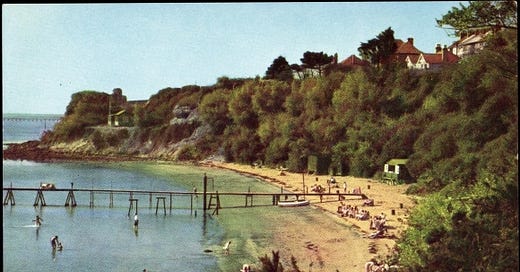The Supreme Court Has No Clue If You Have The Right To Build Sandcastles Or Not
Power imbalances, wherever they show up, can be challenged, but only through the strength and support of community (and a bit of fun doesn’t hurt either)
Happy Friday!
And greetings first from my eyrie and now UPDATE from a sunshine-facing seat on the 12.22 to London Waterloo and now UPDATE from the Gipsy Palace. A little glimpse into the multiple iterations good writing goes through before it’s ready.
For those of you new around these parts, welcome 👋 My name is David and I’m a writer, outdoor instructor and cyclist-at-large with Thighs of Steel. In this newsletter, I write stories that help you and me understand the world (and ourselves) a little better.
Thank you all so much for telling me how much you enjoyed last week’s interview with Alice Baddeley. Your wish for more shall be granted. Like the genius she is, Alice suggested I do an interview chain, so she’s already passed me on to another ‘ordinary adventurer’, Lis van Lynden.
In 2022, with her fiftieth birthday on the horizon, Lis grasped the nettle and decided to rent out her flat for a year so that she could go on the trip of a lifetime: cycling around the whole coast of Britain and Ireland, raising funds and awareness for people — like her — living with multiple sclerosis.
On the eve of departure, Lis found out that her estate agent had taken the liberty of drawing up a contract with her tenants for, not one, but three years. Her brother told Lis well of course you can’t do that. Lis said fuck it.
She’s still on the road.
Lis’s story will be appearing in these pages in a couple of Fridays, after I’ve scuttled away on a top secret assignation in Paris next week (SPOILER).
Before all that, here we are: welcome to edition 379.
The Supreme Court Has No Clue If You Have The Right To Build Sandcastles
Last night, I went to an event put on by the universities of Bournemouth and Southampton called Sharing The Coast: Should We Extend The Right To Roam?
The format was simple: three fifteen minute stories from a legal historian, a community organiser and a marine biologist. They were all provocative tales, but, as the title of this little story might suggest, it was Andrea Jarman, the charismatic legal historian, who blew my mind with the following revelation:
Not even the judges of the supreme court know on what legal basis any of us have any right to go to the beach — any beach.
The confusion began in 2008 when the French owners of Newhaven Port decided to fence off the adjoining beach for that ominous spectre: ‘future development’.
In response, the council and townsfolk of Newhaven tried to get their beach legally recognised as a ‘village green’, which would force the bucket-and-spade hating owners to restore public access.
Despite being very obviously not a village, not green and, in fact, completely underwater half the time, the Court of Appeal averred: West Beach was indeed, in legal terms, a ‘village’ ‘green’.
Unfortunately, the Rouen-based owners of West Beach went one better and appealed to the Supreme Court, who upheld the challenge in 2015.
West Beach remained — and remains — closed.
While deliberating on this case, one of the questions that the judges of the Supreme Court tackled was whether or not cap-doffing members of the public had any right at all to feel the sand between our toes.
As it happens, the wig-wearing hotshots felt that they didn’t actually need come to a final decision on this fundamental question of our access rights to all beaches in order to make a final decision in the particular case of West Beach.
Nevertheless, they did make sure to write down their thinking-in-progress on the topic in a kind of non-binding legal document called an obiter dictum. So that’s nice of them.
According to the finest legal minds in the country, there are three possible answers to the question of whether the riff-raff have a right to build sandcastles. Here they are:
We all have a freestanding right to seashells on the seashore. Yay!
We can all presume that we have permission to get sand in our sandwiches — unless the landowner says NO by means of a sign, fence or mutant sharks. Meh.
We have no right to be there at all. Bathers = trespassers. Yikes.
(If you’re interested in all the gory details, I can heartily recommend this rip-snorting commentary by David Hart KC.)
In a way, I’m mightily glad that the judges didn’t make a firm decision on this. As the Newhaven case shows, the will of the people rarely overcomes the will of the landowner — at least in England Wales.
In Scotland, of course, the right to the beach is enshrined in law:
Access rights extend to beaches and the foreshore. Follow any local guidance aimed at reducing dune or machair erosion or avoiding disturbance of nesting birds. Public rights on the foreshore will continue to exist, including shooting wildfowl, fishing for sea fish, lighting fires, beachcombing, swimming, playing and picnicking.
(Very cute that they specifically include ‘playing’ in that little list.)
We could have that kind of deal in the rest of the UK —
But, I say again, it is HARD to crack through the concrete ceiling of the landowning classes —
But back to the talk last night — and, as a legal historian, Angela Jarman is an optimist. She’s seen progress unfolding over the centuries and it’s always uneven, a serrated graph of triumph and setback.
It does, however, take a lot of graft to fight power. When there is such an imbalance in financial and property resources as there is in the UK, the people have to use the only thing they have: people.
And that’s the story of the night’s second speaker, Steve Elsworth.
Steve was one of the movers behind a community campaign to restore public access to Castle Cove beach in Weymouth.
Castle Cove beach had, since at least 1899, been accessed from the town cliffs via a set of steps. In February 2013, the steps were removed, supposedly due to health and safety concerns, but (in my eyes) suspiciously soon after the beach had been bought at auction.
Imagine the horror of the townsfolk — no, even better, imagine your local beach, park, forest, river, lake suddenly enclosed. Steps are removed, signs go up, a fence is hammered down.
After a period of typical English catatonia — shrug shoulders, shake head, maybe some tutting — a meeting was convened by the local Green Party, where the community was urged into action. No one else will stand up for this. No one else cares.
So they organised.
They started with simple proof: an Ordnance Survey map from 1899 proving the existence of the coastal footpath, including the steps down to the beach. They backed this evidence up with a wonderful collective memory box: a hundred years’ worth of postcards and holiday snaps, showing how the community had enjoyed the beach ‘as of right’.
Holiday snaps like this one, taken of local lad Brian Wilkins in 1938:
When documented proof didn’t result in the immediate restitution of the beach steps, the community group started pulling every other lever they could.
Petitions, pamphlets, socials, fundraisers, freedom of information requests, publicity stunts. All of a sudden, The Steps of Castle Cove became a national problem.
Steve’s big tip for building a campaign is simple: communities have families and families have children and children need to be entertained. So make sure your community events are actually FUN and people will show up and get involved.
With this approach, the campaign snowballed (beachballed?) and, three years in, the community group became a charity, The Friends of Castle Cove Beach, so that they could take donations to fund their increasingly determined struggle for access.
Steve originally thought that the campaign would take six months; it took six years.
Eventually the council caved in. The Friends could have their bloody steps back. But they’d have to design them, get planning permission, pay for the builders and then manage the beach.
So that’s what they did.
Finally, on Easter Saturday 2019, the stairs were opened in a grand fancy dress ceremony. Local politicians, now tripping over themselves to bask in the reflected glory, were turned away.
Instead the red ribbon was cut by that very same Brian Wilkins, back on the beach he’d been enjoying since 1938.
Having done his ceremonial duty, Brian went for a swim, which his wife thought a bit silly at his age.
~
If you’re vaguely local to Dorset or Hampshire and have even a passing interest in spending time in nature, then I implore you to go to the second access rights event that Bournemouth and Southampton are putting on: Sharing The Forest: Should We Extend The Right To Roam, next Wednesday 15 November in Lyndhurst, New Forest.
On this remembrance weekend, what I personally wish to remember is that now is not the time for shrugging, shaking and tutting in the face of oppression. Egregious power imbalances, wherever they show up, can be challenged, but only through the strength and support of community. And, as per Steve, a bit of fun doesn’t hurt either.
Lest we forget that, people, lest we forget that.
If you enjoyed this post, please remember that I still have NO WAY OF KNOWING 😱 unless you like, comment, reply or share. So please do all of those things.
Thanks for your eyeballs, thanks for your support.
Big love,
dc:
p.s. For those of you avidly following along with The Summer Laptop Saga: I’m back on my 2017 Acer (the one that broke in Geneva) and have finally (after two brushes with DPD and three agonising DHL encounters) got rid of the remaining three new (and faulty) computers in my possession. What next? Stay tuned…









I've share a link to this post with him also I'm case he can glean some new and interesting information from you
Hey dude, happy (quick check of the phone) Monday! Do you know of Nick Hayes, he's written an interesting book called Trespass, if you've not read it I feel like it's something you'd be interested in and is very much in line with this post. Big love 🧡